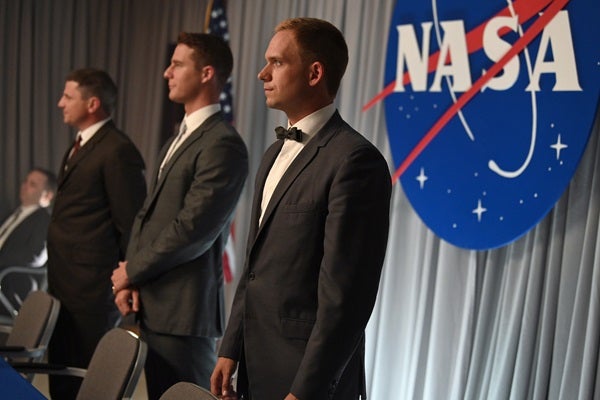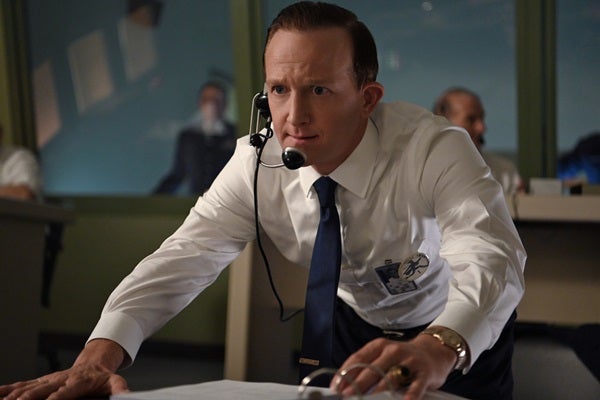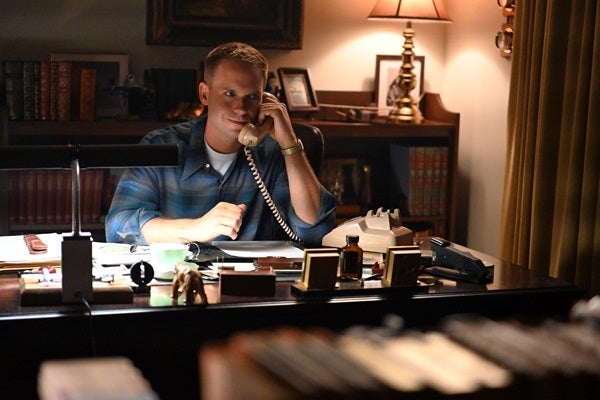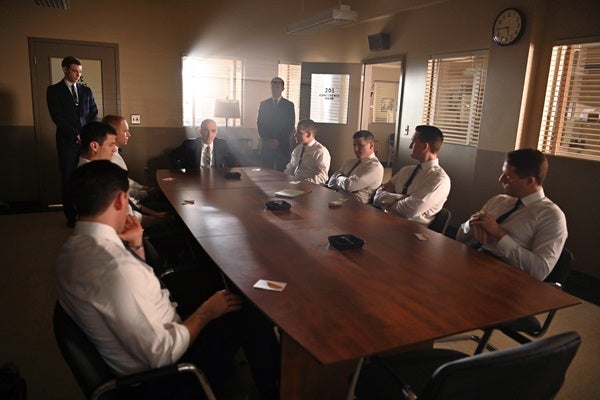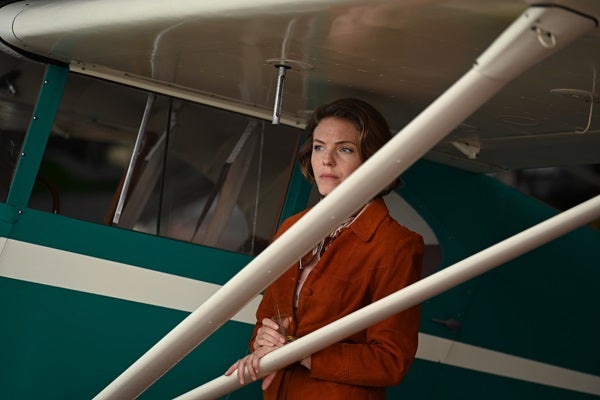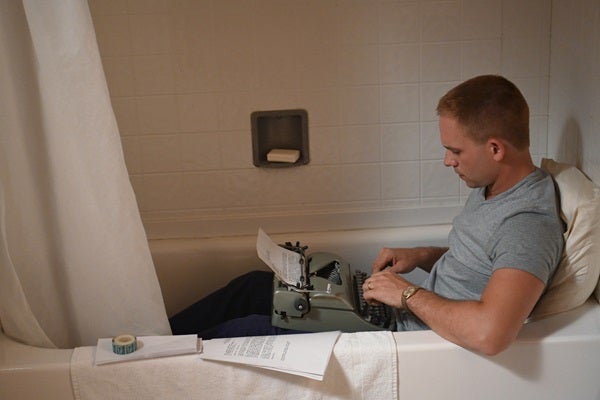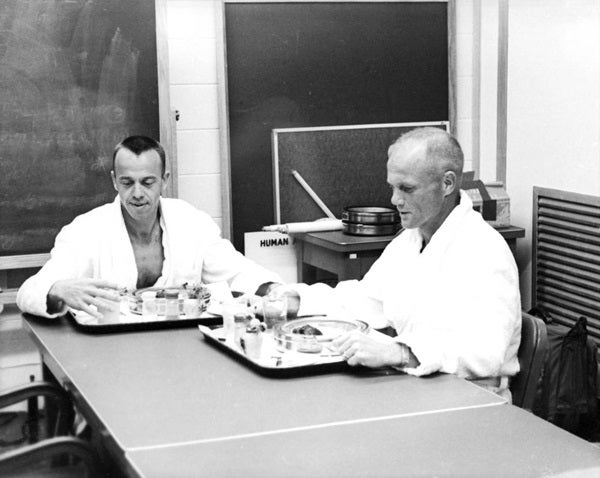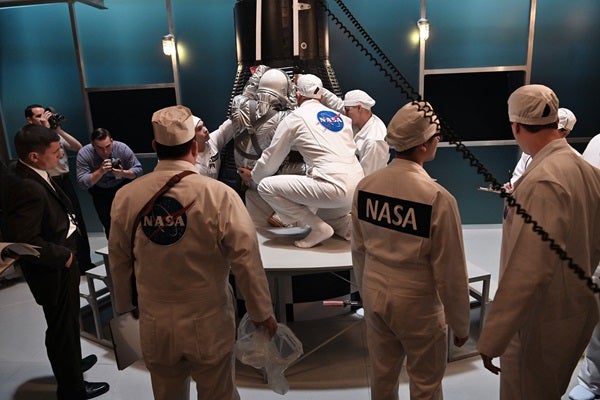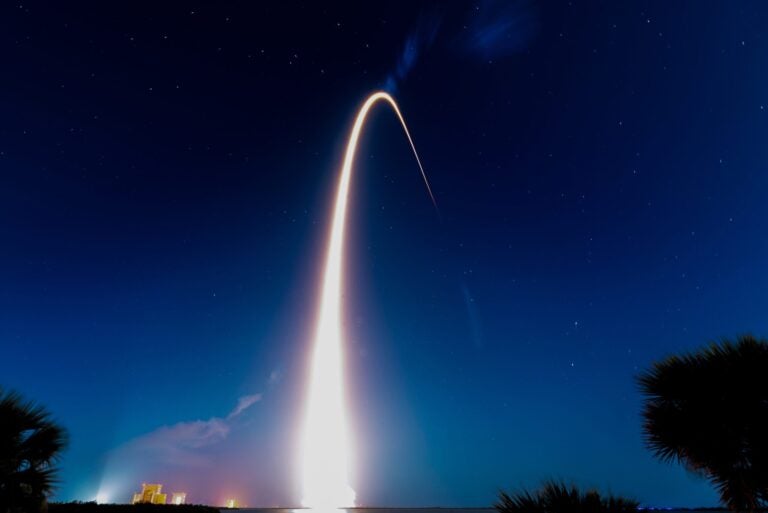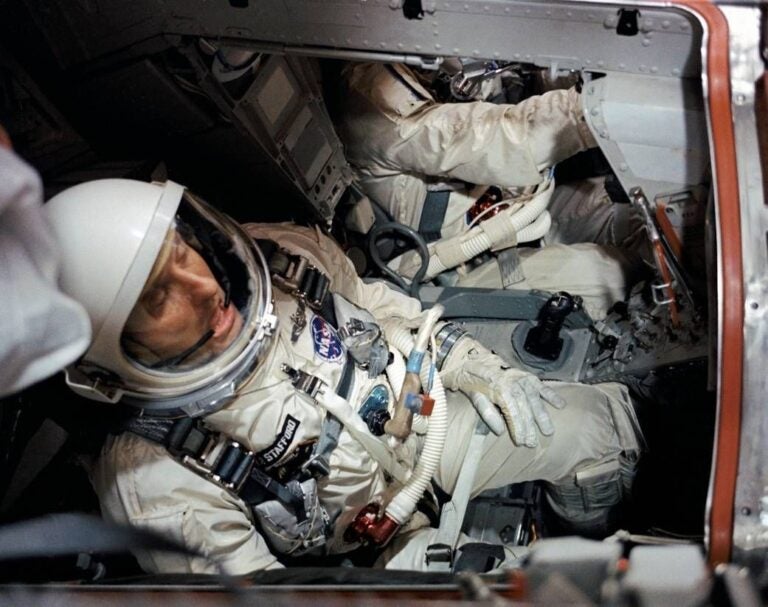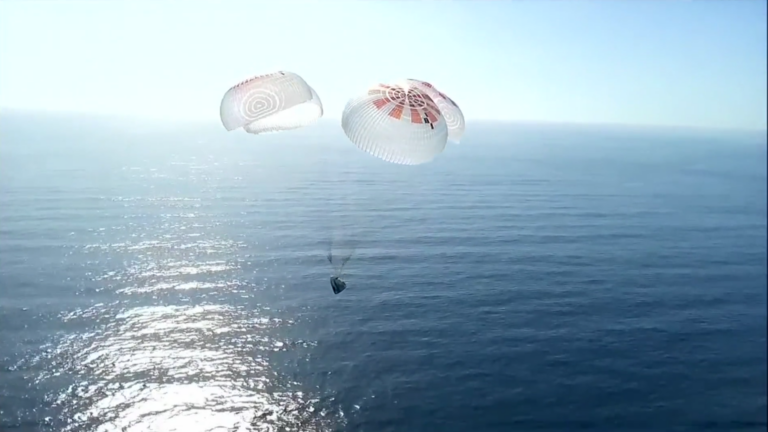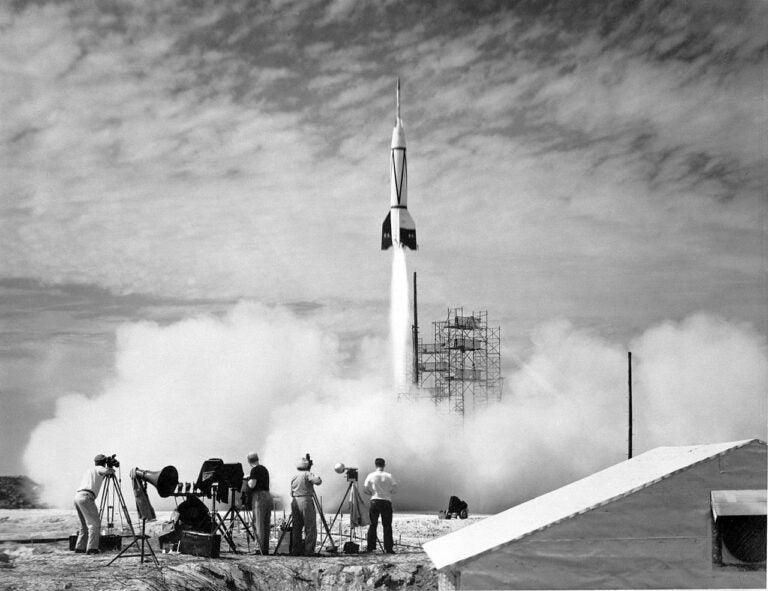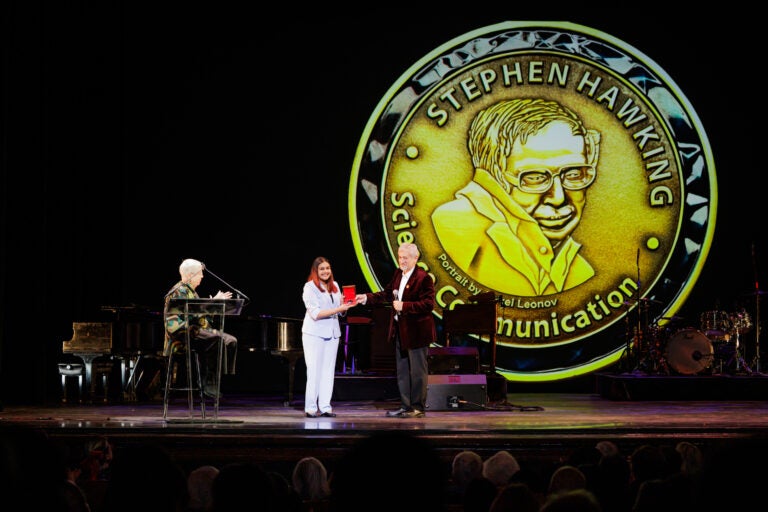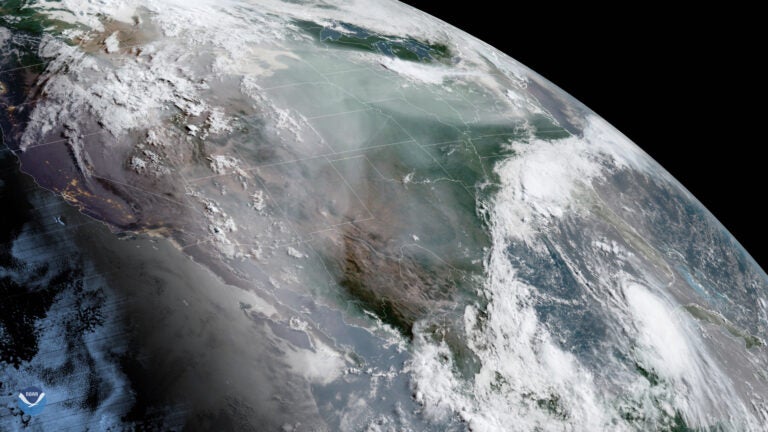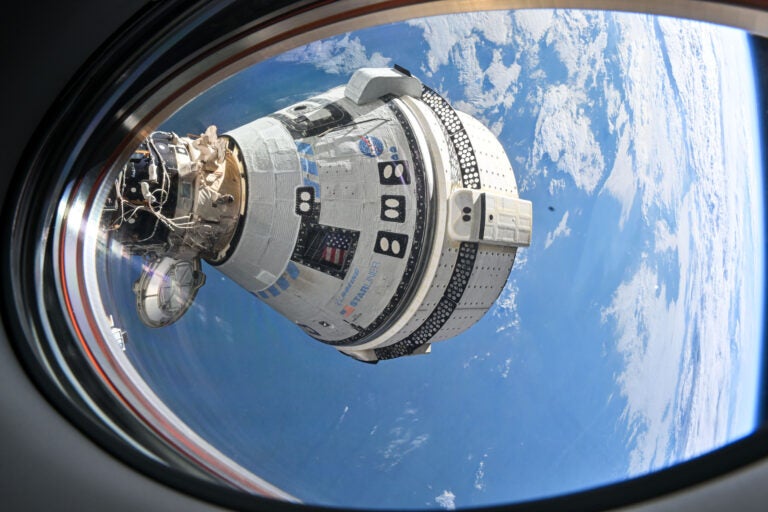As National Geographic’s The Right Stuff hurtles to its close of its first season, it amps up the drama between astronauts Alan Shepard and John Glenn as they vie for the honor of being the first man in space. Of course, what they don’t know is how close Russia is to beating them to the punch…
Here are some quick recaps of episodes 3–8 — and our final verdict on Season 1. (You can read our recaps and reaction to the first two episodes here.)
Episode 3: Single Combat Warrior
Framed around the events of the doomed Atlas-Mercury One (MA-1) uncrewed test flight, the episode opens in the Mercury Control Center, where 80 hours before the launch, flight director Chris Kraft (Eric Ladin) is leading his team in a mission simulation. When the sim goes awry and they lose the vehicle, young Glynn Lunney (Jackson Pace) — one of my favorite characters — informs the team the simulation was designed to simulate physical damage to the comm link from large birds.
Kraft is livid, and shows it. On the other hand, his staff think he’s taking this all a bit too seriously. If we’re honest, Kraft is coming across as a bit of a control freak — a far cry from the calm, collected demeanor of flight director portrayals like Ed Harris’ Gene Kranz in Apollo 13. “Isn’t this just a game?” says the Missile Telemetry Monitor. (And yes, the Atlas rocket was actually a nuclear missile, with the warhead removed and the Mercury capsule more or less bolted in its place.)
Meanwhile, Alan Shepard (Jake McDorman) has finally met his match: the famous Gimbal Rig — the spinning contraption designed to simulate a tumbling spacecraft — which the astronauts strap into and attempt to tame by controlling nitrogen jets. The rig triggers intense bouts of vertigo for Shepard, an early symptom of his Ménière’s disease.
John Glenn (Patrick J. Adams) is also running into some limitations: Bob Gilruth (Patrick Fischler), head of the Space Task Group, is starting to clamp down on some of Glenn’s brown-nosing. When Glenn offers to give an important congressman a private tour, Gilruth tells him: Be part of the team.
The rest of the astronauts hit the bar of the Starlite Motel — tended by Henri Landwirth (Christopher Cassarino), Holocaust survivor and hotelier. While they rouse rabble and dabble with women, Glenn attends a church meeting at a bowling alley and Shepard goes to the Gimbal Rig in the middle of the night, determined to conquer it.
What unites all of the astronauts is their frustration as they start to understand the extremely limited role that the Mercury capsule designers have in mind for them: “Spam in a damn can.” Where will the controls be? wonders Deke Slayton (Micah Stock), echoing the famous scene from the 1983 film where the astronauts demand a window.
When the test flight launch day rolls around, Kraft rallies his team in the control center. Then he tells the Missile Telemetry Monitor that he’s fired — “Just a game? I sure as hell don’t trust you at launch!” — and promotes Glynn Lunney to the position on the spot.
As the Atlas rocket leaves the pad, the astronauts and their families watch in awe — right up until it explodes one minute into flight.
- Although the Gimbal Rig is depicted at Cape Canaveral, it was actually in Cleveland at what was then NASA’s Lewis Research Center — now named after John Glenn.
- Glynn Lunney’s promotion is a great moment for his character, but not surprisingly, it’s too good to be true. By his own account, he spent most of the early test flights at the Bermuda control center, 800 miles downrange.
Episode 4: Advent
October 1959: Russia’s Luna-3 probe has just returned the first ever pictures of the far side of the Moon. For NASA, the pressure is on — and they’ve turned to Wernher von Braun (Sacha Seberg), the legendary German rocket scientist. “He built the Redstone for us, the V2 for Hitler, and one thing I assure you: The Germans did not lose the war because of bad engineering,” says Gilruth.
But NASA’s Mercury-Redstone 1 flight lasts all of two seconds and four inches: The rocket settles back on the pad and then the capsule escape rocket self-jettisons, like an overgrown, very expensive, very pathetic cork popped off a bottle full of highly flammable explosives.
With John F. Kennedy looking the favorite to win the Democratic presidential nomination, everyone at NASA is keenly aware that he’s highly skeptical of the space program. At the urging of his wife, Annie (Nora Zehetner), John Glenn — one of the few Democrats in the group — sees an opportunity to win influence with the up-and-coming Massachusetts senator and spends his Christmas holiday on the phone trying to track down JFK’s people.
This is somehow still a happier way to spend the holidays than Alan Shepard, who has to host his controlling, impossible-to-please father. Or Gordo Cooper (Colin O’Donoghue), who sneaks out of the house in an attempt to rendezvous at motel with his ex, Lurlene.
Incredibly, when Gordo returns home, he manages to save the situation by telling his wife Trudy (Eloise Mumford) that he didn’t get back together with her to go back to space — he became an astronaut to get back together with her. What a line — it’s almost like he had an entire writers’ room to help him come up with that one.
The episode ends at a New Year’s party where Glenn excitedly tells people that he’s invited JFK — only for Kennedy to bail on him and send his straight-faced, charmless science advisor, Jerome Wiesner (Todd Allen Durkin), in his stead. “That’s not Jack Kennedy!” someone says. “Did you invite this guy here?” Kraft asks Glenn. Awkward!
For the record:
- In the immediate aftermath of the “popped cork” fiasco, the Germans confer inside the Blockhouse adjacent to the launchpad. Chris Kraft hears them talking about trying to find…a gun? He hops in a car and races across to the Blockhouse to find a German engineer approaching the loaded rocket with a rifle. It makes for great comedy — and is only partly exaggerated. No, Kraft didn’t tackle a German with a gun. But somebody actually did suggest depressurizing the fully-fueled rocket by shooting the oxidizer tanks to relieve the pressure, which Kraft wisely declined. “If you don’t know what to do, don’t do anything,” became one of his famous maxims after it was reported in a 1965 TIME profile.
Episode 5: The Kona Kai Séance
The astronauts gather around a conference table, and in walks Bob Gilruth. Ah yes, this is the delicious reality TV moment the season has been building to: the reveal of the first man to be voted off the planet.
But first, a commercial break! Or at least a flashback, to a press tour stop in San Diego, where the Mercury Seven are supposed to wine and dine the executives and employees of Convair, the maker of the Atlas missile (and a forerunner of what would become Lockheed Martin and today’s United Launch Alliance).
After getting the news that one of Wally Schirra’s (Aaron Staton) Navy friends has died after his jet flamed out, they spend some time around the fire bonding and trading war stories — and then they leave John Glenn to work the room and fend for himself.
Meanwhile, Trudy Cooper is at her local airport, looking to shake off her piloting rust, when she has a visitor: Jerrie Cobb (Mamie Gummer), one of the “Mercury 13“ — women aviators who, with private backing, passed the same medical exams as the Mercury Seven and pushed NASA and Congress to give them slots in the astronaut corps. (Although they didn’t succeed, they certainly paved the way for those who followed.) Cobb offers Trudy a slot in her unofficial program — and encourages her to get Gordo to back them publicly.
Later that night, Glenn is woken by Shepard pounding on his door. Shepard is desperate: he explains he’s just been caught with a girl in Tijuana by a photographer for the San Diego Herald, and the picture will run the next day. It could bring down the program.
“I’ll take care of it,” says Glenn — and he does, working the phone until he gets through to the editor in chief of the local paper, smooth-talking him into spiking the story with cliches about journalism being the first draft of history. And it works! (Journalists love being told they write the first draft of history.)
The next morning, Trudy tells Gordo that she’s joining Jerrie Cobb’s efforts. Big character moment, and he almost blows it: “Is that why you decided to come out here? I don’t want to ruin a great weekend.” The worst. But reluctantly, he comes around. “Another astronaut in the family? Okay, then.” That was close!
Cut back to the conference room from the beginning of the episode — and Gilruth has made his decision about who will fly first. Actually, he’s decided not to decide — he’ll leave it to a peer vote among the astronauts: If they themselves could not fly, who among them would they choose to go? The look on Shepard and Glenn’s faces is a great payoff for this episode, as Glenn suddenly realizes he’s been licking the wrong boots. Predictably, Shepard wins the vote.
He’ll be the first man in space. Unless the Russians beat them to it.
For the record:
- The Kona Kai séance is well covered in Tom Wolfe’s book. In fact, much of the dialogue in Shepard and Glenn’s epic shoutfest is pulled verbatim from Wolfe’s account — although that’s not to say it’s accurate, given Wolfe’s propensity for dramatic license. It’s worth noting that in Wolfe’s telling, Shepard was not an undeserving winner, either, scoring highest in some training exercises.
- Wolfe didn’t specifically identify Shepard as the astronaut whose indiscretions in a Mexican border town triggered Glenn’s lecture, and neither did Glenn in his memoir — though he admitted that his ensuing lecture might have hurt his chances of being chosen first. However, that detail was reported by Lily Koppel in her 2013 bestseller The Astronaut Wives Club.
Episode 6: Vostok
Although the astronauts know who they have chosen, NASA hasn’t name Shepard publicly, opting to leave the public in suspense. The episode kicks off with yet another press appearance where John Glenn has to grit his teeth and smile and pretend he doesn’t know that he won’t be the first man in space.
Afterwards, LIFE Magazine’s Loudon Wainwright (Josh Cooke) tries to get Glenn to admit off the record what everyone thinks they know — that he’s to be the first. When Glenn demurs, Wainwright tells him that NASA should announce it soon. “Until it’s public, they could still change their mind.” Cut to John Glenn’s thinking-very-hard face.
Later, Annie Glenn wakes up in the middle of the night to find John sitting in the bathtub in his pajamas pounding away on a typewriter. He’s writing letters to the CEOs of NASA contractors and politicians, campaigning for Shepard to be pulled from the flight, calling his conduct “moral turpitude.”
Meanwhile, Gilruth has gotten wind of Glenn’s letters. When he confronts Glenn at his home, Glenn lets loose: “I saved this program!” Gilruth responds that Glenn is the one endangering the program with his campaign against Shepard.
At the Starlite Motel bar, an intoxicated Wernher von Braun lets slip to Shepard that there’s been a change to the flight order due to a medical issue. Terrified that he’s going to be grounded over his vertigo episodes, he goes to Kraft’s office to plead his case. But when he arrives, Kraft is already meeting with Deke Slayton — members of Kennedy’s review committee have found out that Slayton has arrhythmia. He’ll never fly as a Mercury astronaut. This is probably the most gut-wrenching scene in the whole show so far, for the reason that of all the astronauts, Slayton is maybe the only one who isn’t written to come off as a terrible cad.
The episode ends with one last twist, though: NASA head of public affairs Shorty Powers (Danny Strong) waking Shepard up to tell him that the Russians have just sent up Yuri Gagarin. Foiled!
For the record:
- As affecting as Slayton’s scene is, the timing is massaged for the sake of the season’s story arc: In reality, he wasn’t grounded until March 1962 — just two months before he was set to fly on his Mercury mission.
- Glenn admitted in his memoir that he wrote a letter about the first astronaut selection process — but only to Bob Gilruth, and only complaining about the fairness of a peer vote.
- During Ham’s test flight, in the Mercury Control Room, we see that Glynn Lunney has now been promoted to the Flight Dynamics Officer (FIDO), the position where he will develop how NASA handles spacecraft trajectory planning. In Gene Kranz’s autobiography Failure is Not an Option he called Lunney “the pioneer leader of trajectory operations, who turned his craft from an art practiced by a few into a pure science.”
Episode 7: Ziggurat
Glenn and Shepard are at a bar. Glenn: “Al, I’m real sorry you’re not the first man in space.” Shep: “No, you’re not.” That about sums up their relationship at this point.
It’s April 1961, and the Kennedy administration’s invasion of the Bay of Pigs has gone terribly wrong. On TV, analysts are speculating JFK will need a win — something big if he wants to recover politically from this fiasco.
For starters, he decides to put the first crewed Mercury launch on live national TV — and not everyone at NASA is happy about that. “Has everyone in DC lost their damn minds?” rails Glynn Lunney — now all of 24 years, no longer the green new hire, and showing some fire. “We have no idea how many cosmonauts the Russians killed.”
Meanwhile, Trudy Cooper is telling her daughter Cam about Jerrie Cobb and her push for women astronauts. Cut to the bar of the Starlite Motel, and the Mercury Seven have opinions about women pilots, too, and they’re as bad as you would expect: dismissive and condescending — except for Gordon Cooper, who cautiously offers his support.
The next day, the astronauts are asked about Cobb’s efforts at a press conference. All eyes are on Gordo — including Trudy and Cam, watching from home. He hesitates. Finally, he answers: “We sent up a chimp, didn’t we? Might as well send up a lady someday.” The men in the room — which is to say, everyone in the room — hoot and holler. Gordo blew it, and he knows it.
Now we’re into the buildup to the launch: the gathering crowds, the van ride to the Cape, and suddenly — hey, this is where we came in!
We’re back to the very opening scene of the show, the breakfast that Shepard and Glenn shared the morning of his launch. Shepard gets his final medical exams, straps into the capsule, the music builds — and then the launch is scrubbed. Bad weather.
Back at the living quarters that Shepard and Glenn are sharing for the night, Shepard goes up to the roof for some fresh air. And now the show launches into maybe its most contrived setpiece — a confrontation on the roof, where Shepard stands on the edge of the building and screams at Glenn, “I bet you’d love it if I jumped off.”
“You’re a miserable, sanctimonious ass and nobody likes you,” Shepard tells Glenn. Glenn replies that nobody likes him, either. Shepard retorts: “Yeah, but they want to be me.” Touché.
It’s a chance for Patrick J. Adams and Jake McDorman to strut their acting chops, but it does feel a bit … much.
For the record:
- While Trudy Cooper was indeed an accomplished pilot, there’s no record of her ever being recruited by Jerrie Cobb. However, Gordon Cooper’s sexist quip was very much real and is featured in the Netflix documentary Mercury 13.
Episode 8: Flight
Here we go: finally, someone is going to space — and finally, we’re going to see the show’s special effects budget on the screen.
This part of history is probably the most familiar, and despite that — or perhaps because of it — it works. We get the vignette about Shepard peeing himself on the pad. We see Chris Kraft call in the final goes for launch from his controllers. We hear the gravely tones of Walter Cronkite narrating over the countdown. All the reaction shots!
But when Shepard returns to base, he seems deflated. He tells Glenn, “The traffic jam I was in this morning was longer than my flight. Fifteen minutes — you go up and you come down.”
You can already see Glenn plotting his revenge arc — or should that be revenge orbit? — in Season 2.
And Season 2 is coming, don’t worry — JFK greenlights it in his “before this decade is out” speech, much to the astonishment of Gilruth and Kraft. We don’t know if we can even get to the Moon by 1980 or 1990, says Kraft. Gilruth responds: “Chris, we don’t know if we can ever do it.”
But even as the space program is given new direction, the astronauts are forced to confront what’s next in their personal lives. When Gordo comes home, Trudy is leaving him — packed and halfway out the door.
Gordo tries to apologize. “I love you,” he says. “I know,” says Trudy. Cue the carbonite! “But you just play to the room.”
But the worst for Trudy is still to come: She meets with Jerrie Cobb in a diner, ready to fully commit to her Mercury 13 program — but Cobb says she’s rescinding the invitation. They can’t associate themselves with Gordo’s comments.
Trudy says: I’m a good pilot, that’s all that matters.” Cobb replies: “I wish that were true. That’s what I’m trying to change. But we’re just not there yet.”
The season ends on a moment of uplift — literally: Back at the local airport, Trudy sits with her daughter in the cockpit of a taildragger, giving Cam her first flying lessons. As the camera pulls back from the windshield, the propeller fires up and the plane rolls down the small grass strip.
Trudy and Cam take the skies. Cut to titles: THE RIGHT STUFF. Yes, they have it.
Closing thoughts
So, does the show have the right stuff? Just enough, in my opinion. It succeeds in what it sets out to do. The fundamental relationships and character foils were already there in Wolfe’s book. The series amplifies them — though sometimes beyond belief.
Still, I can’t help but miss the presence of test pilot Chuck Yeager — the first man to break the sound barrier, and a character who loomed so large in Philip Kaufman’s film. Not only did his character put a face to the crucial work at Edwards Air Force Base that laid much of the groundwork for NASA’s success, it gave the film the emotional room to regard from a distance how the spaceflight mythmaking machine took test pilots and turned them into all-too-polished celebrities.
In some ways, this version of The Right Stuff is pitched as a modern deconstructionist take, one that strips away the rah-rah patriotism of Wolfe’s book to show the deeply flawed humans at its heart. But in another way, the remake is the ultimate demonstration of spaceflight’s mythic sway on us, of how the legends of these men can be told and retold, refashioned for the sensibilities of every era, endlessly reconstructed until they become the mythological figures they were always intended to be.
The Right Stuff is streaming now on Disney Plus. According to reports, Season 2 begins filming in San Diego in March 2021.

